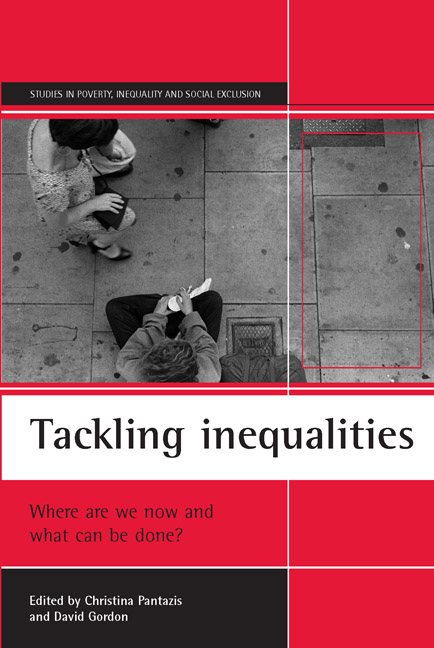Book contents
- Frontmatter
- Contents
- List of tables and figures
- Preface
- Acknowledgements
- List of acronyms
- Notes on contributors
- 1 Introduction
- 2 Inequalities in income, wealth and standard of living in Britain
- 3 Inequalities in employment: problems of spatial divergence
- 4 Educational inequalities and Education Action Zones
- 5 How can we end inequalities in housing?
- 6 Tackling inequalities in crime and social harm
- 7 Poverty across the life-course and health
- 8 Inequalities in health service provision: how research findings are ignored
- 9 A mortality league table for Cabinet ministers?
- 10 Ending world poverty in the 21st century
- Index
4 - Educational inequalities and Education Action Zones
Published online by Cambridge University Press: 05 July 2022
- Frontmatter
- Contents
- List of tables and figures
- Preface
- Acknowledgements
- List of acronyms
- Notes on contributors
- 1 Introduction
- 2 Inequalities in income, wealth and standard of living in Britain
- 3 Inequalities in employment: problems of spatial divergence
- 4 Educational inequalities and Education Action Zones
- 5 How can we end inequalities in housing?
- 6 Tackling inequalities in crime and social harm
- 7 Poverty across the life-course and health
- 8 Inequalities in health service provision: how research findings are ignored
- 9 A mortality league table for Cabinet ministers?
- 10 Ending world poverty in the 21st century
- Index
Summary
Introduction
Our knowledge of the extent and changing nature of educational inequalities in Britain is patchy and our understanding of the causes of these inequalities much more so. This chapter will discuss just what data are available to assess inequalities before considering three of the policies of the present government which have a bearing, either directly or indirectly, on these inequalities. The first of these policies is the publication of schools’ results on attainments in tests and examinations, the second is setting targets for attainments, and the third, the one which receives most attention in this chapter, is the creation of Education Action Zones (EAZs). The chapter will then consider some of the issues which have to be faced when evaluating policies such as EAZs and will end with conclusions about information gaps and research needs.
Throughout the chapter, reference is made to educational inequalities, rather than to educational inequality, and the focus is on inequalities of outcome, notably pupils’ performance in tests and examinations. This is not to downplay the importance of other outcomes such as self-esteem and social responsibility, although these are more difficult to measure, nor is it to ignore the importance of inequalities of ‘process’ – the way in which different groups are treated within the education system – which might contribute to inequalities of outcome. Inequalities of process include factors such as school exclusions, streaming and setting arrangements within schools, and expectations held by teachers about different groups of pupils. However, it is the case in British society, as in Western society generally, that performance in tests and examinations determines entry into higher education which, in turn, has a strong bearing on life chances.
The three inequalities in performance to receive most attention are: gender inequality, ethnic group inequality and inequality between social classes or, more generally, socioeconomic circumstances. Another division, which has not been widely studied, but which is becoming increasingly important with rapid demographic changes such as the rise in one-parent families, is inequality between family types. Inequality by generation, or by birth cohort, is also important both in its own right and, especially, to describe trends in inequalities. Are, for example, social class differences widening over time? The absence of systematic data on trends in educational inequalities is a serious problem for anyone trying to monitor the effects of government policies of all types.
- Type
- Chapter
- Information
- Tackling InequalitiesWhere Are We Now and What Can Be Done?, pp. 87 - 100Publisher: Bristol University PressPrint publication year: 2000



